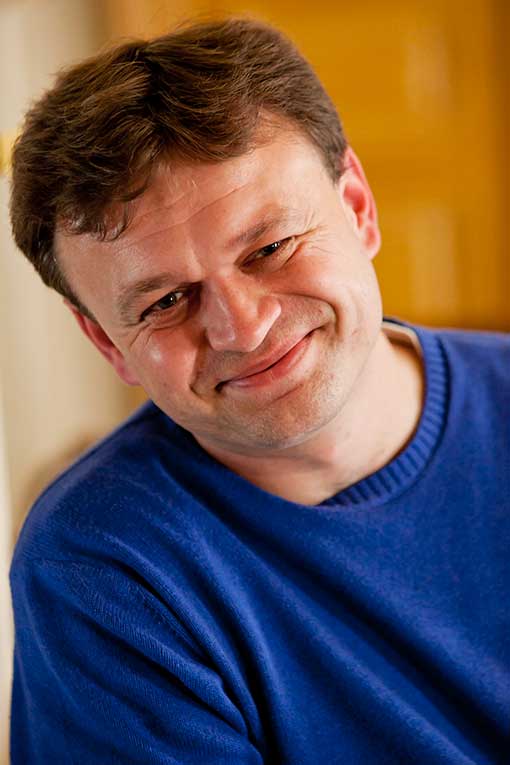The international music festival Moravian Autumn started on Sunday. It has been organised by the Brno Philharmonic for the first time. Several changes have been introduced in its concept. The dramaturge of the festival, Vítězslav Mikeš, talks about its preparation, programme and future.
You have joined the Brno Philharmonic as a dramaturge fairly recently. Among other things, you are also in charge of the festival at Špilberk Castle. How much time did you have for Moravian Autumn?
I started working for the philharmonic in November. That gave me a neck breaking deadline for this season and for the festival at Špilberk Castle you’ve mentioned. That said, I had been working on Moravian Autumn as a part-timer since last summer. At that time, my predecessor Jan Žemla suggested a few names which I gladly accepted. Nevertheless there was a lot of work to be done to make sure the festival would be compact and scheduled as intended.
In the past the festival had conceptual sub-titles like “De_kadence”, “Hudba svobody a nesvobody” (Music of freedom and oppression). You have decided to strike these sub-titles. So what is the present-day concept based on?
As far as I am concerned, a topical festival is nothing to be against. It has its pros – it makes the promotion easier and facilitates the entire dramaturgy. That being said, such festivals require that certain conditions be fulfilled, such as a carefully chosen main topic and the possibility to achieve it without lobbyist interventions. What I mean is that I am not saying no to topical festivals in the future, but it should not be the rule. This year’s concept was partly based on the plan for the season; we were striving for a balanced ratio of classical music and newer music (which in fact is typical abroad). We could have commemorated some anniversaries, but we decided to avoid names whose anniversaries were commemorated on a global scale (Wagner’s or Verdi’s). We focused on “smaller” anniversaries. And third, I wanted confrontation between the global elite and the Czech elite (especially personalities with roots in Brno).
The programme consists of several “national blocks”, such as Czech Day, which was yesterday, or the upcoming Polish Weekend or Norwegian Day. Was this a plan from the beginning or did it just happen?
This idea gradually crystallized and the final idea, which includes the gastronomy programme attached to the musical programme, should be attributed to the manager of the festival Lucie Šnajdrová. As far as I remember, the primary idea was to perform solely Czech music because the day of the festival would have fallen on the Czech national holiday. The effort to commemorate this year’s Polish honourees Lutosławski, Górecki and Penderecki resulted in the “Polish weekend”. That was just one small step from a proper marketing event with proper promotion of the “national days”.
 Was it hard to convince Valery Gergiev? Didn’t you try to have him play Russian composers? Why is Berlioz on his programme?
Was it hard to convince Valery Gergiev? Didn’t you try to have him play Russian composers? Why is Berlioz on his programme?
Lucie Šnajdrová should take the main credit for the fact that we’ll have LSO with Valery Gergiev. As we share an office, I can attest that the negotiations lasted a long time. Ironically, most of the obstacles were related to bureaucratic conditions and the Czech tax system. The performance by LSO and Gergiev during Moravian Autumn will launch their European tour, which determined the programme: Berlioz’s symphonic music is Gergiev’s key repertoire for this season. On the other hand the programme was more than to my liking because it is not cheap. Plus Berlioz is one of my favourite Romantic composers. Nevertheless, I won’t say no to any future opportunity to invite Gergiev to Moravian Autumn, albeit with a different orchestra and a Russian repertoire.
Was the festival affected by the elections? Do people even care about anything else than politics?
We could not have anticipated the early elections while scheduling the festival. The elections did in fact affect the festivals. They have significantly reduced the space available for its promotion. Many people also completely forgot about culture. And then you read Zweig’s The World of Yesterday where he writes about the turn of the century dailies in Austria which published reviews and interviews with opera singers on front pages… Politics dominate the public discourse thanks to the media. But I try to remain optimistic. I believe there are still enough people left who care about art. Otherwise I would not be here, doing what I do.
Dramaturges generally hate my next question, but I will ask you anyway: is there anything in the programme that you are particularly happy about? Any matter of the heart?
I know what you are trying to suggest: a good dramaturge should say something along the lines of “I am happy about the entire programme”. But okay. The concert of the Katowice radio orchestra with the music of Henryk Górecki is the matter of my heart. Not just because of the music as such. This concert is a dramaturgical concentration of many aspects: an excellent ensemble from a town where Górecki spent most of his life and where he also died; Tadeusz Strugała, a man of great charisma and a contemporary of Górecki’s (this generation produced many great personalities of art), plus he is a conductor who contributed significantly to the promotion of Polish authors who are now famous all over the world, such as Górecki himself. This concert is also powerful due to the fact that the performance of the Symphony of Sorrowful Souls, which is a de factor requiem for the innocent war victims, falls on All Souls’ Day weekend. Of course I will attend all events of the festival and I am looking forward to the entire programme – including a salmon dinner during the “Norwegian” evening concert programme or the experience with Gergijevov’s magic. There is no better word for his conducting.
You really have to think ahead when planning a festival. Any ideas for 2015?
I do have quite a lot of ideas. I don’t want to reveal any secrets for the time being. We will be smarter once we have received an analysis after this year’s event.
Any wish or message for this year?
I know it has been said before, but I hope to be able to prove that giving Moravian Autumn to the Brno Philharmonic was a good decision. I hope people will come and appreciate the programme and I hope to retain the festival team that has prepared this year’s event, as it is a joy to be working with them.
































No comment added yet..